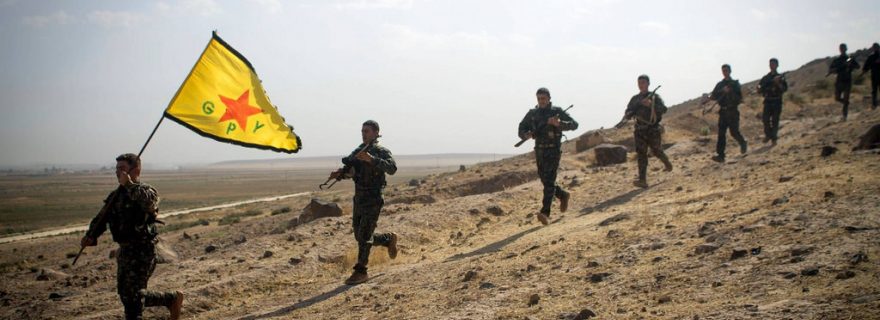Ideology in Rojava: The Forgotten Element
The conflict in Syria has provided the opportunity for the PYD to implement a new form of democratic confederalism. A more nuanced understanding of the PYD's ideology can improve understanding of contemporary developments in Syria.
Stories about Syria’s Kurdish minority and their control over a large area in the north-east of the country, known to the Kurds as Rojava, regained prominence in the media towards the end of 2018. Donald Trump’s announcement to withdraw US troops from Syria in December was quickly followed by reports that the People’s Protection Units (YPG), the mainly-Kurdish armed force of the Democratic Federation of Northern Syria (DFNS), had invited the Syrian regime to retake the northern city of Manbij. Meanwhile, Turkey’s increasing aggression along its southern border poses an existential threat for the DFNS, politically dominated by the Democratic Union Party (PYD) whom Turkey accuses of being an affiliate of the Kurdistan Workers’ Party (PKK) who have been engaged in intermittent conflict against the Turkish state for nearly forty years. Coverage of events relating to Syria’s Kurds is almost always from a military strategic perspective and through the prism of PYD or YPG relations with state actors such as the USA, Turkey or Syria. As such, information about the PYD’s ideology, which laid the foundations for the governance structures put in place throughout the Rojava region in the wake of their successes against ISIS, has been conspicuously absent. Yet, as the discussion below aims to highlight, a more nuanced understanding of PYD ideology can improve understanding of contemporary developments and may also have implications for future peace building measures.
If PYD ideology is ever alluded to in the media or political discourses it is usually misrepresented as an (ethnically defined) nationalist movement. It is therefore implied, or just assumed, that the PYD is a secessionist movement. However, recent case studies by Joost Jongerden (2019) and Nathalie Colasanti et al. (2018) present a different picture: The conflict in Syria has provided the opportunity for the DFNS to implement an ethnically mixed, anti-statist, feminist, commune-focused form of democratic confederalism, based on the influence of imprisoned former-PKK leader Abdullah Öcalan and libertarian socialist writer Murray Bookchin. This ideological connection to the PKK explains Turkey’s labelling of the PYD as a terrorist organisation and is used to justify their military interventions in northern Syria.
The PYD’s anti-statism is an important aspect to address as it has implications for current and future relations with the state. Ideologically, they neither aim to forge their own Kurdish state, nor seek to overthrow and replace the current Syrian regime; rather, they reject the ideal of the state system in general. In practice, they hope to obtain the freedom to operate democratic confederalism from within the existing state structure. In this sense, they seek autonomy but not secession, as is usually assumed. Despite being supported for several years by the USA and other Western powers, they ideologically present themselves as a benevolent cause, unthreatening to the existence of the regime. Officially, as stated in their “Social Contract”, they wish to promote the model of democratic confederalism throughout the Syrian state.
Being open to collaboration with the state, while providing effective governance and social services through the DFNS, the PYD challenges the traditionally assumed antagonistic relationship between state and non-state armed actors. As such, the PYD represents a potential example of what Benedetta Berti (2016) defined as “hybrid” organisations. While it would be imprudent to predict the future, these ideological imperatives will surely be influential if the PYD is allowed to participate in future peace processes. At present, it sheds light on the YPG’s withdrawal from Manbij. The apparent coordination between the YPG and the Syrian state is highly significant as an indicator for any potential political settlement to the conflict and could potentially be considered a good-will gesture towards al-Assad’s regime to be borne in mind during their reconsolidation of power.
While we may understand and forgive the media for omitting the complexities and nuances of the Syrian conflict to make it palatable to a broad audience, for state powers a failure to grasp their ideological imperatives may lead to flawed policy making. This is not to argue that ideology is necessarily a primary explanatory factor of PYD actions in Syria, but an accurate and thorough understanding of a group’s perspectives and ambitions is surely important if they are to be included in political transitions and peace building measures in the future.


